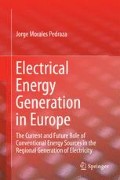Abstract
Undoubtedly, energy production and, particularly, the generation of electricity and their sustained growth, constitute indispensable elements for the economic and social progress of any country. Energy constitutes the motive force of civilization and it determines the level of economic and social development of any country. To ensure adequate economic and social growth in any country, it is indispensable that all available energy sources be used in the most effective and economical manner, particularly for the generation of electricity. The mix of primary fuels used to generate electricity has changed a great deal over the past four decades on a worldwide basis. Coal continues to be the fossil fuel most widely used for electricity generation in almost all regions (except in the Latin America and the Caribbean region). However, electricity generation using natural-gas-fired power generation plants grew also rapidly in the 1980s and 1990s, and it is expected to continue to grow in the next two decades.
Access this chapter
Tax calculation will be finalised at checkout
Purchases are for personal use only
Notes
- 1.
The EU will review the participation of renewables in the energy mix of the countries for the coming years in order to increase its share from 20 to 27 %.
References
Bjørnmose, J., Ferran, R., Tatsiana, T., & Dinne Smederup, H. (November, 2009). An Assessment of the Gas and Oil Pipelines in Europe. IP/A/ITRE/NT/2009-13 PE 416.239 Directorate General for Internal Policies; Policy Department A; Economic and Scientific Policies Industry, Research and Energy, EU.
Demirbas, A. (2010). Natural gas. In A. Demirbas (Ed.), Methane gas hydrate. Berlin: Springer.
EU Energy Policy to 2050—Achieving 80–95 % Emissions Reductions. (2011). A report by the European Wind Energy Association EWEA, March 2011.
International Energy Outlook. (2010). Energy Information Administration, DOE/EIA-0484 (2010), Washington, DC, USA, September 2010.
International Energy Outlook. (2013). With Projections to 2040. Energy Information Administration (EIA), Department of Energy; DOE/EIA-0484(2013); USA.
Kavalov, B., & Peteves, S. D. (2007). The future of coal; DG JRC Institute for Energy. International Energy Outlook 2010, Energy Information Administration, DOE/EIA-0484 (2010), Washington, DC, USA, September 2010.
Morales Pedraza, J. (2008). The current situation and the perspectives of the energy sector in the European region. In F. L. Magnusson & O. W. Bengtsson (Eds.), Energy in Europe: Economics, policy and strategy. New York: Nova Science Publisher.
Šliogerien, J., & Krutinis, M. (June, 2008). Assessment of Lithuanian energy generation companies’ infrastructure combined with sustainable environment principles. In: 25th International Symposium on Automation and Robotics in Construction. Institute of Internet and Intelligent Technologies, Vilnius Gedeminas Technical University, Vilnus, Lithuania.
World Energy Resources: Oil. (2013). World Energy Council 2013. Retrieved 2013, from http://www.worldenergy.org/wp-content/uploads/2013/09/WER_2013_2_Oil.pdf.
Author information
Authors and Affiliations
Corresponding author
Rights and permissions
Copyright information
© 2015 Springer International Publishing Switzerland
About this chapter
Cite this chapter
Morales Pedraza, J. (2015). Conclusion. In: Electrical Energy Generation in Europe. Springer, Cham. https://doi.org/10.1007/978-3-319-08401-5_5
Download citation
DOI: https://doi.org/10.1007/978-3-319-08401-5_5
Published:
Publisher Name: Springer, Cham
Print ISBN: 978-3-319-08400-8
Online ISBN: 978-3-319-08401-5
eBook Packages: EnergyEnergy (R0)

